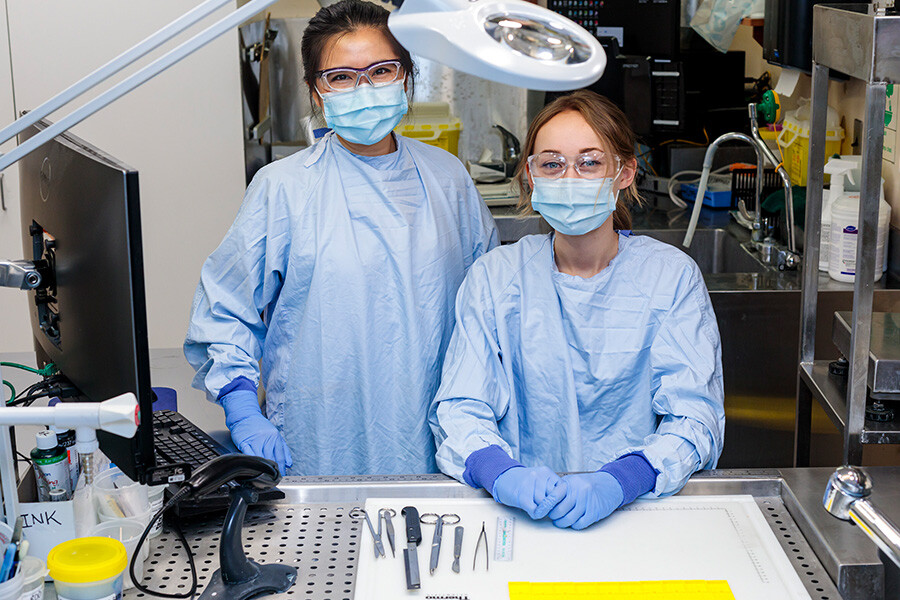Main Second Level Navigation
Laboratory Medicine and the study of disease for medical students
Join our mailing list: find out more about LMP programs
Temerty Medicine’s MD Program is one of the largest undergraduate medical education programs in Canada.
To treat patients, you must understand disease and its diagnosis.
Faculty in the Department of Laboratory Medicine and Pathobiology can help future clinicians understand the importance and relevance of Laboratory Medicine to clinical care and the career paths it opens.
Why is Laboratory Medicine important for clinical care?
Did you know that approximately 70-80% of treatment decisions in a hospital are based on what happens in the clinical laboratory?
Multidisciplinary teams of experts in various areas of Laboratory Medicine analyze samples, make diagnoses, provide treatment guidelines and recommendations, and conduct leading research into the causes, diagnosis, and treatments of disease.
Physicians and scientists in Laboratory Medicine use a wide array of conventional tests and advanced molecular diagnostics to provide clinicians, such as oncologists, immunologists, and infectious disease physicians with comprehensive diagnoses.
As an MD student, learning more about Laboratory Medicine will help you to:
- become a better clinician as you understand the role laboratory medicine specialists play in treating your patient and how you can work together to improve health outcomes.
- understand more career options so you can discover what you love to do. There are as many areas of Laboratory Medicine as there are clinical specialties so find out which one is right for you.
- see that the stereotypes and myths about Laboratory Medicine just aren’t true. Pathologists and Medical Microbiologists work in a team setting and use their communication skills to play a vital role in patient care.
- broaden your skillset and knowledge in other specialties, such as medicine and surgery, by exploring Laboratory Medicine through Electives.
The main areas of Laboratory Medicine we train clinicians in are:
- Diagnostic and Molecular Pathology
- Hematological Pathology
- Medical Microbiology
- Neuropathology
- Forensic Pathology as a sub specialty - you must complete an Anatomical of General Pathology residency first
Get experience of Laboratory Medicine
Medical students at the University of Toronto can learn more through several opportunities.
The LMP Summit
This free two-day program is aimed at medical students who are enrolled in an undergraduate MD program in Ontario and are interested in exploring the field of Laboratory Medicine. Our first summit took place in 2024.
MD students at U of T: Foundations teaching (years 1 and 2)
In the first year of your studies, you will be introduced to Laboratory Medicine, including lessons on:
- Histology
- Inflammation and Infection
- Blood
- Microbiology
- Integrated Anatomy
You will learn from, and interact with, Pathologists and Medical Microbiologists during Case based learning (CBL) – introduction to medicine course sessions. Find out more about the structure of Foundations.
You can arrange shadowing experiences with experts in disease diagnostics as part of your Enriching Educational Experiences (EEEs).
You also receive opportunities such as an introduction to Forensic Pathology from the Chief Forensic Pathologist of the Ontario Forensic Pathology Service (OFPS), and Deputy Chief Coroner, Dr. Michael Pollanen, who teaches medical students and invites them to visit the OFPS.
MD students at U of T: Clerkship (years 3 and 4)
During Clerkship, you will hear from Laboratory Medicine Specialists in Bridge Courses: Transition to Clerkship (TTC) and the Transition to Residency course (TTR).
Electives (open to medical students studying at institutions in Canada)
If you are interested in obtaining experience in Laboratory Medicine, apply for an elective rotation within our department.
The Electives Program at the University of Toronto places several categories of students:
- University of Toronto medical students during their Clerkship Elective block
- Visiting students from AFMC/AAMC accredited medical schools
- Visiting students from International FAIMER accredited medical schools.
You can apply if:
- you are registered in the Clerkship phase of your medical program at a Canadian or US medical school when the elective would take place.
- you are registered in the second to last (penultimate) or final year of your medical program (not including postgraduate training) at an International medical school when the elective would take place.
Electives can take place across our hospital partner network in institutions such as:
- The Hospital for Sick Children (SickKids)
- Sinai Health: Mount Sinai
- Sunnybrook Health Sciences Centre
- Unity Health Toronto: St. Michael’s Hospital and St. Joseph’s Health Centre
- University Health Network: Toronto General Hospital (UHN-TGH)
University of Toronto students can find out more through the MD program website.
Students at other universities, see the UME Electives Program website for full details and how to apply.
You usually must register by the first week of October each year.
MD students at U of T: Enriching Educational Experiences (shadowing opportunities)
Open to medical students at the University of Toronto.




